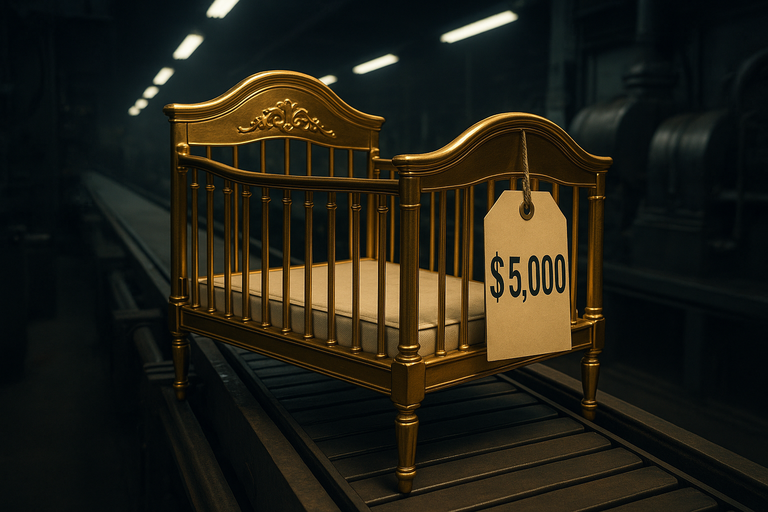Children for the State: The Hidden Costs of Economic Survival

Among those who support the curtailing of immigration, both legal and illegal, there are very few who understand the financial shockwaves this is likely to cause. Of course, for the politicians throwing red meat to the dogs, speaking of nuance serves no purpose. But because this is my blog, I feel like it's a good bucket of chum to get into.
To have an effective conversation, I should start by pointing out one of those uncomfortable truths many of us ignore: capitalism, as it stands today, is closer to a Ponzi scheme than it is to anything else. Debt is passed from one generation to the next, and in order for continuous growth to occur, a growth in population must follow.
There's a reason why Elon and other prominent pro-natalists are so fixated on birth rates. They are motivated by fear — the fear that declining birth rates and an aging population will destroy the economic health of a country. I can't say they are wrong, per se. As far as I understand it, this issue is already a calamity in countries like Japan, so we can conclude the pro-natalists' position holds water quite well.
With this in mind, I would like to bring to your attention a recent move the Trump administration has proposed. A voice probably whispered into Trump's ear the looming problem their immigration crackdown is likely to create. So they've decided to take the bull by the horns — clearly, not understanding the bull's anatomy.
A five-thousand-dollar check for new mothers. An incentive for people to make more children for the machine. If you leave it at that, if your analysis is skin-deep, it does seem like this administration is attempting to balance the sheets. But a look under the hood reveals plenty of problems. I almost don't know where to begin.
With very little effort, I was able to learn the average cost of giving birth in the United States. The number? A whopping eighteen thousand buckaroos. That is, without insurance, of course. With employer insurance, it's closer to three grand. Still, not exactly a bargain, if I'm allowed to say so.
So let's think about this for a minute. Who is more likely to have children in America? Who would learn of the news that there's a new check to be had if a child is provided for the state? Yes, your mind is leaning in the right direction.
An affluent family — one that has home security, good incomes, and plenty of opportunity — might look at a five-thousand-dollar check and think very little of it. However, a struggling single mother, who relies on the state to barely survive, might see this new check as light at the end of a tunnel, as temporary as it may be.
I've been attempting to refine my arguments against this pro-natalist movement. I realize that when I talk to people who espouse this philosophy, I'm not speaking to their true concerns. They are genuinely afraid of the consequences of dwindling numbers, but all I can say is that we seem to serve different masters.
It is my belief that humanity should not sacrifice itself for the sake of keeping an economic system afloat. Which is to say, if capitalism cannot survive without a meat grinder, then it should probably perish — or evolve into something else altogether. This is not to say I'm rooting for the collapse of society, but rather that we can't forsake our freedoms, our autonomy, just to keep a dying system breathing a little longer.
Besides, I thought we stopped sacrificing children to our gods a long time ago.
MenO
Massive migration have changed the focus of the necessity to promote natality in high industrial countries. Hope parents will find the resources to build a family.
Regards
https://x.com/jewellery_all/status/1917174654227411315
#hive
https://x.com/lee19389/status/1917337457902903391
#hive #posh